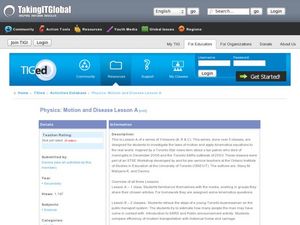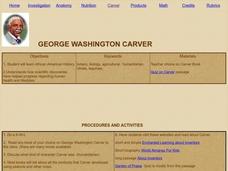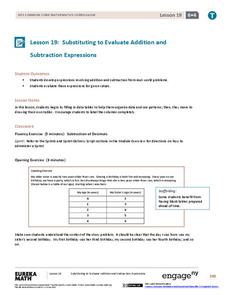Curated OER
How to Clean Up An Oil Spill
Students practice cleaning up an oil spill. In this good citizenship lesson, students experiment with different cleaning agents to see which ones clean oil off a soft toy. They compare this experiment with the volunteers helping with the...
Curated OER
TV Tells it All
Students discuss the concept of gender bias and stereotyping. In this social science lesson, students determine what the influence of television on gender roles represents and compares the chage in gender roles of today to those of their...
Curated OER
Physics: Motion and Disease
High schoolers read media and identify examples of science technology and society. In this physics lesson, students learn about acceleration and velocity. High schoolers estimate how many people would have come in contact with a person...
Curated OER
Prescribing Beauty
Students explore self image. In this personal health lesson, students watch "Prescribing Beauty," and discuss what beauty is. Students develop beauty questionnaires and complete them.
Curated OER
President Obama's Address to Students Across America
Learners write about goals, responsibility, and persistence, and listen to President Obama's speech. In this President Obama lesson students create concept webs, listen with a purpose, and list the challenges of our generation.
Curated OER
George Washington Carver
Learners learn and research the life of George Washington Carver. In this historical figures instructional activity, students read a book on George Washington Carver, discuss his character and the challenges he faced in becoming a...
Curated OER
Responsible Youth in the News
Students research newspapers and magazines for articles about young people being responsible or being irresponsible. In this responsibility lesson, students discuss responsibility and the articles. Students answer questions in groups...
Curated OER
Rules, Rules, Rules
Fourth graders create their classroom rules. In this Mayflower Compact lesson, 4th graders listen to the Plymouth story and learn about the Mayflower Compact. Students analyze the Mayflower Compact and create a class compact of...
Curated OER
The Cuban Missile Crisis in 10 Steps
Tenth graders research the events of the Cuban Missile Crisis. In this Cuban Missile Crisis lesson, 10th graders work in groups to order a group of ten events of the crisis.
Curated OER
The Meaning Of Percent
This lesson provides students with a variety of exercises which allow them to increase their ability to understand percentage.
Curated OER
US Geography: The Midwest
Students investigate the geography and agricultural products of the Midwestern United States. In this US geography lesson, students watch and discuss a video that depicts the Midwest of the US as the breadbasket of the country. They make...
Curated OER
Choosing A Career - Without Limitations
Students examine their views on gender bias in the classroom. In this gender bias/gender equity lesson, students define non-traditional career areas for their gender. They discuss their perception of "male and female" jobs before...
Curated OER
What is Cacao?
Students use the Internet to learn about the cacao plant. In this plants lesson, students complete a KWL chart on chocolate, learn about cocoa plants and discuss the parts of a plant. Students use the Internet to learn how the cacao...
Curated OER
Not So Sweet
Learners explore farming, slavery and cacoa farming. In this agricultural science activity, students fill out KWL charts, create PowerPoints and do internet research. Learners write letters to chocolate companies requesting them not to...
Curated OER
Women in Rhode Island History
Students study women leaders. In this US histoy activity, students discuss women who made a difference in Rhode Island and interview each other pretending to be one of these women.
Fredonia State University of New York
Watch Your Step…You May Collide!
Can two lines intersect at more than one point? Using yarn, create two lines on the floor of the classroom to find out. Cooperative groups work through the process of solving systems of equations using task cards and three different...
Polar Trec
Talk Story: A Native Way of Knowing
The steps of the scientific method examine a problem, make a prediction, and attempt to solve the problem—similar to the path most stories take. In the activity, individuals see how stories can explain natural events similar to the way...
American Farm Bureau Foundation for Agriculture
My Miniature Greenhouse!
Here is an activity that will peak your super scientists' interest and knowledge of greenhouse gardening. Green thumbs flourish when they build, prepare, take care of, and observe their seedlings inside a miniature greenhouse. With...
Macmillan Education
Know Yourself
After completing a short self-assessment, partners use the provided questions and take turns acting as life coaches.
EngageNY
Modeling Relationships with a Line
What linear equation will fit this data, and how close is it? Through discussion and partner work, young mathematicians learn the procedure to determine a regression line in order to make predictions from the data.
EngageNY
First-Person Computer Games
How do graphic designers project three-dimensional images onto two-dimensional spaces? Scholars connect their learning of matrix transformations to graphic design. They understand how to apply matrix transformations to make...
EngageNY
Comparing Linear Functions and Graphs
How can you compare linear functions? The seventh installment of a 12-part module teaches learners how to compare linear functions whose representations are given in different ways. They use real-world functions and interpret features in...
EngageNY
Substituting to Evaluate Addition and Subtraction Expressions
Substitute this resource for what you used to use. Learners identify patterns in data tables and write addition and subtraction expressions to represent relationships. Substitution allows them to solve problems in context in the 20th...
Museum of Disability
Don't Call Me Special
Introduce young learners to the idea of disabilities and making friends with children who are different than they are. Using Don't Call Me Special - A First Look at Disability by Pat Thomas, learners are guided through the new vocabulary...

























